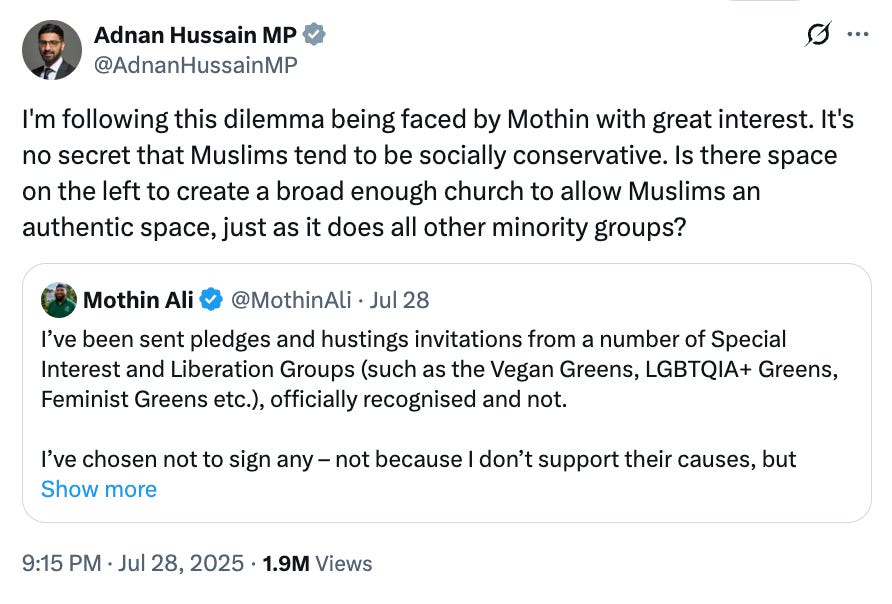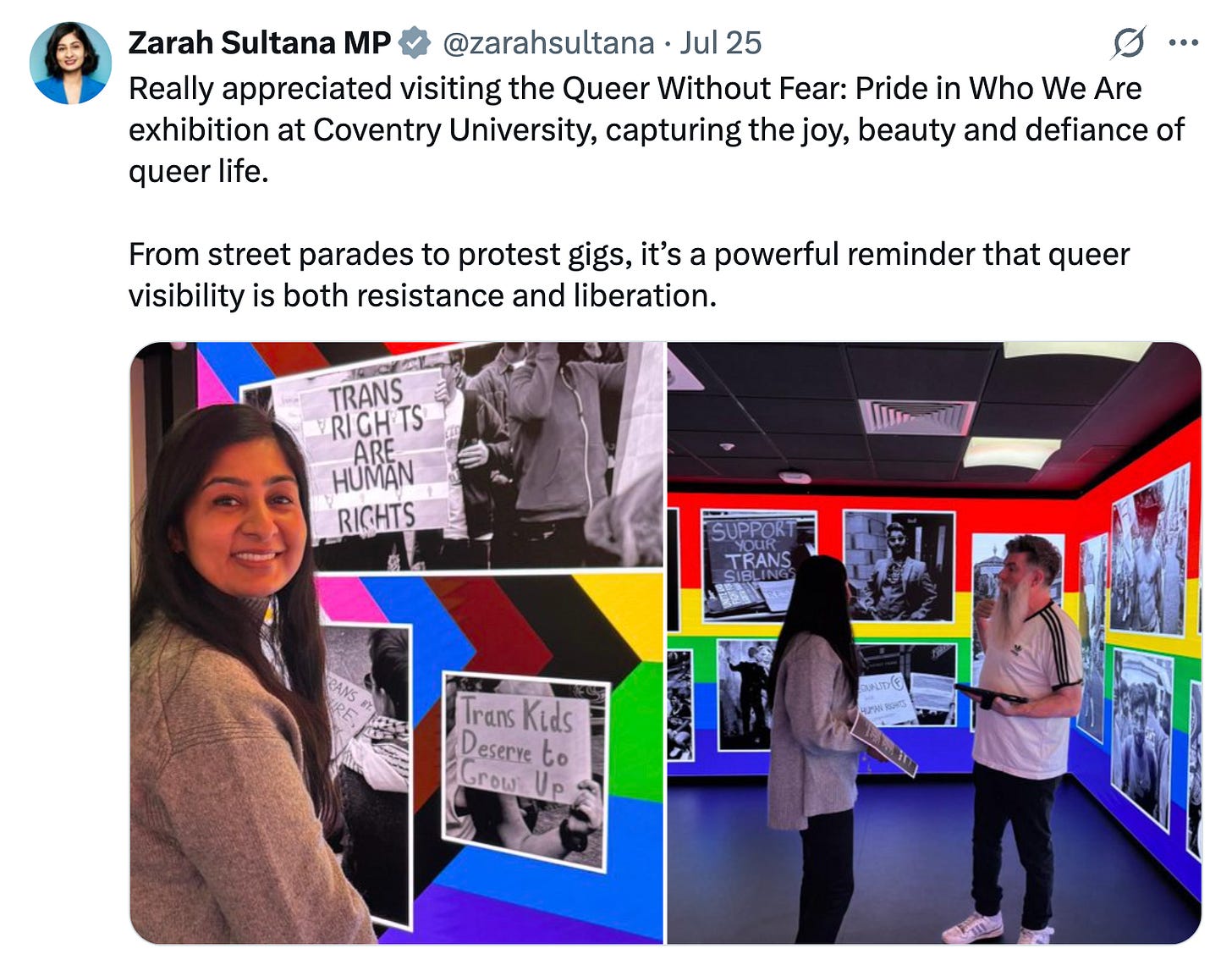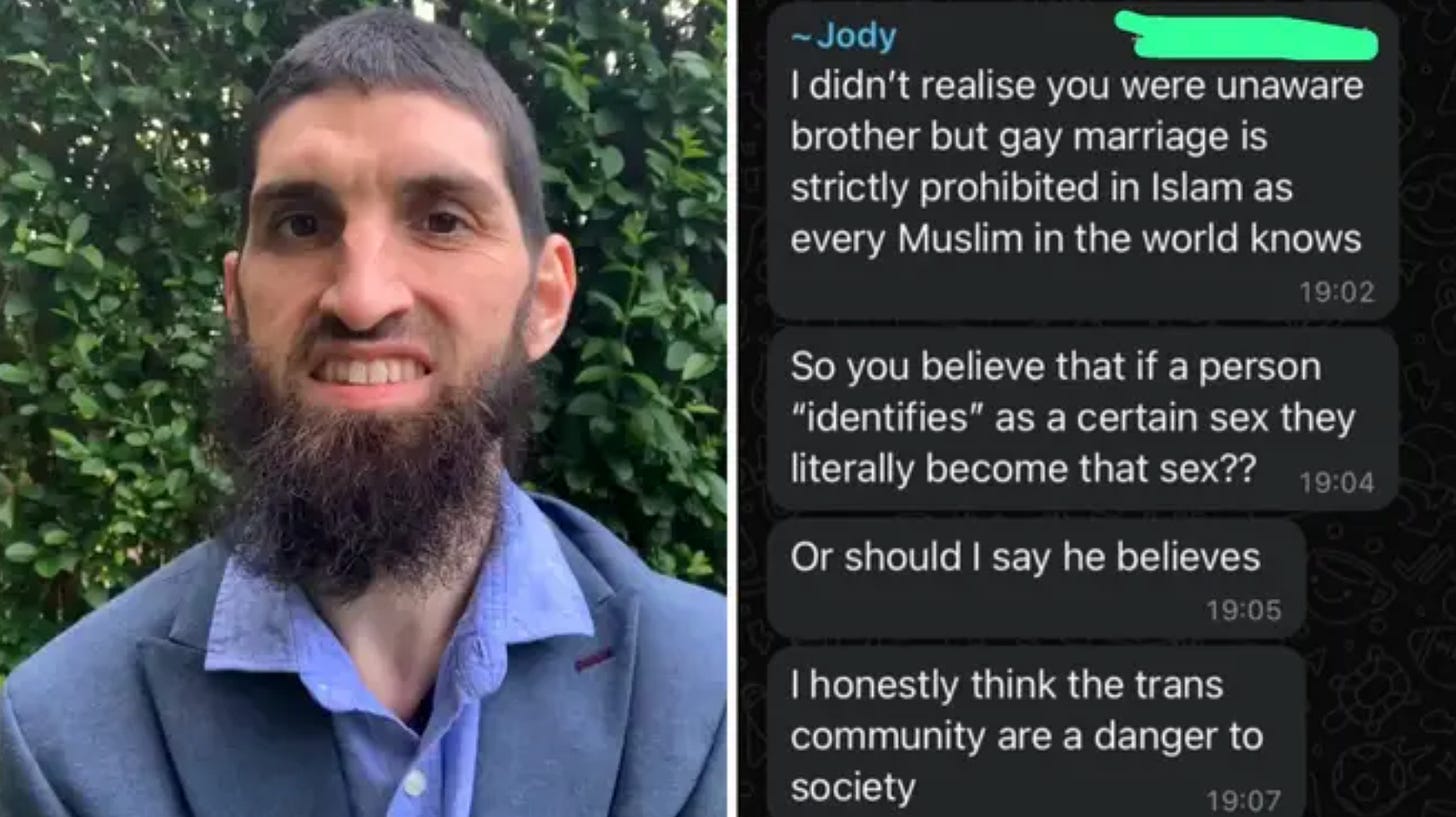Your Party's Identity Crisis
How the uneasy alliance between the progressive left and religious conservatives is already fraying
In the early hours of 5th July 2024, it dawned upon Labour MPs Jon Ashworth, Kate Hollern, and Khalid Mahmood that they would not share in the celebration of their party’s landslide victory. They would lose their seats.
For big beasts Wes Streeting and Jess Phillips, the night was just as nail biting - though they ended up scraping by, with wafer thin majorities of 528 and 693 votes respectively. This was the electoral bombshell so much election coverage had missed. The rise of the Gaza Independents.
Shockat Adam, Ayoub Khan, and Adnan Hussain won against Labour incumbents, meanwhile Iqbal Mohamed won in a new seat, against a strong candidate - Rachel Reeves' former director of communications.
After the election, these four ‘Gaza Independents’ - who fought their campaigns almost exclusively on the issue of the Israel-Gaza conflict, appealing almost exclusively to muslim voters - teamed up with independent MP Jeremy Corbyn to form the Independent Alliance of MPs in Parliament.
So far, so understandable. A loose collection of independent MPs aligned on foreign policy issues and easy populist campaigns like opposing the government’s means testing of the winter fuel allowance. Things get interesting, however with the formal announcement of a new political party - The Party That Is Definitely Not Called Your Party - last week.
All Independent Alliance MPs issued their support for this new outfit of the left, with its co-founder former Labour turned independent MP Zarah Sultana formally joining the parliamentary grouping last week. Now with Sultana, Corbyn, and four Gaza Independent MPs, the Independent Alliance is in Parliamentary terms larger than Reform, the DUP, the Green Party, and Plaid Cymru.
But can this alliance hold? And can the as yet officially unnamed Your Party build on the success of the Gaza Independents?
To begin to answer this question we need to turn to an internal fight within the Green Party this week, another organisation of the sometime populist left that in recent years has attracted politicians motivated almost solely by the foreign policy issue of the Israel-Hamas war.
Mothin Ali, who was elected as a councillor for the 40% muslim and 65% minority ethnic Gipton and Harehills ward of Leeds City Council in 2024, attracted controversy after he declared his victory as “a win for the people of Gaza”, and shouted ‘Allahu Akbar’ after his election.
After the initial controversy of his unusual victory celebrations, however, Ali won plaudits for intervening in the Harehills riots, whereby the local community overturned a police car, torched a double decker bus, and formed a burning barricade across a main road. Ali was filmed tearing wooden pallets and wheelie bins away from members of the local community as they tried to add them to the inferno.
All of this took place just weeks after his election.
Ali was widely celebrated, even called a hero, following his intervention that night - a factor that no doubt played a significant part in his decision in June this year to stand for deputy leader of the Green Party. Sadly for Ali, however, his candidacy has not been plain sailing.
Controversy arose online this week when Ali revealed he had refused to sign a number of pledges - he listed “Vegan Greens, LGBTQIA+ Greens, Feminist Greens”, going on to say:
“I’ve chosen not to sign any – not because I don’t support their causes, but because I wanted my messages to come directly from me, ideally sitting down in conversation, and not via third parties. I believe the “pledge” system runs a risk of undermining our internal democratic processes. I did get this message to one of the groups in advance, but I recognise that my communication on this could have been better.”
Eyebrows have been raised as it is widely speculated the only message he had sent “to one of the groups in advance” was his message to the LGBTQIA+ Greens. Could it be that he chose to list “Vegan Greens” first in his list of groups he would not sign the pledges of, in order to throw off the scent? Many Green members have expressed their unease at his approach.
Enter Gaza Independent MP Adnan Hussain, who says the quiet bit out loud:

Hussain says what Mothin Ali cannot. Most muslims are socially conservative. It is not unreasonable to conclude from his refusal to sign feminist and LGBTQIA+ statements, that Ali himself holds some socially conservative beliefs. Can the Green Party accept that? Well that, surely, depends upon whether or not the Green Party wishes to have a deputy leader who holds some socially conservative views.
I’ve written before about how a previous deputy leader of the Green Party, Shahrar Ali, said he felt forced out of the party due to his gender critical beliefs. In fact this Ali (no relation) successfully sued his party, and received a £90,000 payout plus £9,100 in damages. Bizarrely, the Equality Act did not allow a political party to discriminate against an individual over their political beliefs. But that’s a story for another time.
The Green Party clearly sells itself as a party firmly on the left, both on social and economic issues. Which is undoubtedly why Mothin Ali has taken the stance he has on signing statements. As a religious muslim, he must feel a great tension in signing statements that go against the widespread interpretation of the teachings of Muhammad. He also, however, does not want to lose his election. Hence the tight lipped tightrope.
Some politicians are less guarded about their views. Enter Zarah Sultana, who the day after joining the Independent Alliance alongside Adnan Hussain, posted photographs of herself at a rainbow exhibition entitled Queer Without Fear.
Clearly Sultana is a proud LGBTQ+ ally, and not unaligned with the views held by many of her constituents. Her Coventry South seat covers the campuses of both Coventry University and much of Warwick University. Her socially liberal constituents will expect nothing less than support for socially liberal causes. This is true, too, of Jeremy Corbyn.
Using British Election Study data, Electoral Calculus firmly classes both Coventry South and Islington North as seats with populations more socially liberal than average.
But how well would Sultana’s social media post go down in the highly religious muslim areas that her other colleagues in the Independent Alliance represent?
The remaining Independent Alliance MPs represent a different Britain. Adnan Hussain’s Blackburn, Ayoub Khan’s Birmingham Perry Barr, and Iqbal Mohamed’s Dewsbury and Batley are significantly more socially conservative than the average Westminster seat. Of the seats won by the Gaza Independents, just Shockat Adam’s Leicester South is mapped as very marginally more liberal than average.
And it’s worth remembering that the average seat in Britain is significantly more socially conservative than Zarah Sultana.
The new Corbyn-Sultana party however will be looking to win more seats than just those won by Gaza Independents at the last election. It’s instructive to look to the Gaza candidates who performed well but didn’t quite make it over the line. Jess Phillips was almost toppled by George Galloway’s Workers’ Party candidate Jody McIntyre.
McIntyre, who campaigned almost exclusively on the issue of Gaza, almost won in Birmingham Yardley - a seat that had become the centre of a wave of anti LGBT education protests in muslim areas. Hundreds of mainly muslim protesters gathered outside school gates, hearing from imams falsely claiming children were being taught “anal sex, paedophilia and transgenderism”. Exclusion zones eventually had to be established.
And separately but relatedly, as LBC revealed during the election, McIntyre himself had described “the trans community” as “a danger to society”, and wrote “gay marriage is strictly prohibited in Islam as every Muslim in the world knows”. These are not all so shocking statements from the Workers Party of Britain, a party set up to appeal to both socially conservative voters be they muslim or white working class.
They are, however, statements that reveal a real rift between the various seats that a new left wing pro-Gaza party led by Zarah Sultana and Jeremy Corbyn might seek to win.
George Galloway’s brand of pro-Gaza conservatism chimes much more readily with the muslim communities it seeks to represent. Beyond issues of foreign policy there is very little that connects the worldview of liberal university students to that of the congregation of a North Birmingham mosque.
The Independent Alliance group already saw a split at the budget last year, when Iqbal Mohamed and Ayoub Khan spoke out against the Labour government’s policy to tax private schools. A position far removed from that of their comrade Jeremy Corbyn. South and East Asian communities in particular are massively overrepresented in independent schools, and Mohamed and Khan were speaking up for their constituents.
Given the divisions over an issue like taxing education, just wait until the thornier topics of feminism or LGBT rights arise. It’s hard to see a party that loudly defends transgender rights and backs gay marriage storming to victory in areas where the 2024 Gaza candidates did well.
It’s hard to see the six Independent Alliance MPs sticking together through the formation of a new party of the left, and into the next general election - despite their supportive statements at this early stage.
Indeed, it’s hard to see a party of the left in the mould of Sultana doing well outside socially liberal urban areas flush with plenty of graduates.
And consequently, Britain is hurtling towards a further split from the current split on the left:
A Sultana-Corbyn left party largely created off the back of views on Gaza, yet only appealing to not particularly muslim areas
A separate Gaza association appealing to areas with far higher muslim populations
PLUS
A Labour Party attempting to appeal to both
And a Green Party
split between the quaint rural nimbyism of the current leadership
and the copycat Corbyn campaign of left-populist challenger Zack Polanski
and that’s before we even get onto the single issue socially conservative Gaza Greens.
Adnan Hussain shared Mothin Ali’s statement this week asking if there is room on the left to allow muslims an authentic space. And I am sure there is. But it is unlikely he will find that authentic space for socially conservative views within a self professed progressive political party.
Big tent politics is in retreat. The electorate is fragmenting more than ever before.
And it may well fragment faster than comparative coalitions overseas, like the one that grew in Hamtramck, Michigan. The city won plaudits from progressives when it became the first in America to elect a muslim majority council, only for those same progressives to then cry betrayal when that same council passed legislation banning Pride flags.
The Guardian reported a former Hamtramck mayor saying “We supported you when you were threatened, and now our rights are threatened, and you’re the one doing the threatening.”
The ‘Gays for Gaza’ campaign sees no contradiction in their views - they see it as a moral mission whereby one oppressed minority group supports another. It is hard, however seeing this coalition working the other way around. And looking to the electoral reality in Britain today, the new left party may well struggle almost as much as the Labour Party has in some of the most diverse parts of the country.
Before it’s even properly begun, five party politics is already at sixes and sevens.






